Love makes ‘Brokeback’ Oscar favorite
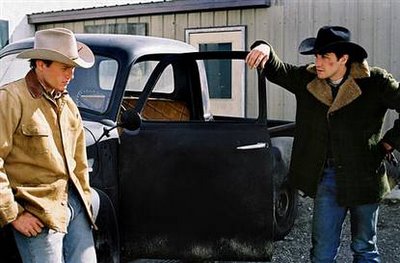
COMMENTARY
By Erik Lundegaard
MSNBC contributor
Updated: 10:35 a.m. ET Jan. 31, 2006
Tale of star-crossed lovers attracts audience, Academy votes
I first saw a trailer for “Brokeback Mountain” during an opening night showing of “The Constant Gardener” at the Lagoon Theater in self-consciously liberal Minneapolis. There were titters from the crowd (possibly from the line “I wish I knew how to quit you!”), and afterward my friend Laurion leaned over and said, “Gay cowboys: I’ve never seen it before and it’s already a cliché.” I thought, “Well, so much for that. If it can’t win over this crowd it can’t win over anyone.”
That was in September.
A few months later my friend Jim in Seattle asked me about “Brokeback.” Jim’s a movie buff, always intrigued by the Oscar candidates, but he said he wasn’t interested in “Brokeback.” He couldn’t articulate why. My sister’s husband, Eric, in Detroit, another movie buff, was similarly uninterested. I had assumed both Jim and Eric within “Brokeback’s” demographic: liberal city-dwellers with gay friends. I thought, “Well, so much for that. If it can’t win over these guys it can’t win over anyone.”
That was in November.
As I write this it’s nearly February and while many people are still tittering — “I wish I knew how to quit you” gags, movie poster parodies, Pres. Bush’s press conference — the film is the furthest thing from a joke. “Brokeback” has been chosen the best picture of the year by The Golden Globes, The Producers Guild of America, Boston Film Critics, Broadcast Film Critics, L.A. Film Critics, N.Y. Film Critics and (big surprise) San Francisco Film Critics. It’s got nine BAFTA (British Academy Award) nominations, and the Directors Guild of America tapped “Brokeback’s” Ang Lee as best director. What should be its biggest awards rival, “Munich,” has largely been forgotten (zero BAFTA nominations, for example), leaving only smaller films like “Capote” and “Good Night and Good Luck” as competition. A win at the Academy Awards on March 5th already feels like a fait accompli.
More startling than its critical reception, it’s selling. Focus Features played the numbers game correctly. When “Brokeback” showed in only five theaters they talked up its huge per-screen-average of over $100,000. When it opened wider and its per-screen-average dipped to normal levels (less than $10,000), they talked up its weekly and overall take. It debuted December 9th at no. 15 and hasn’t dropped lower since. It was no. 8 the following week and then 14, 13, 8, 9, and 5. Early estimates for this weekend place it sixth, with an overall gross of $50 million. Where are the other best picture contenders? None are in the top 10, and none except “Walk the Line” and (just barely) “Crash” have grossed as much as “Brokeback.” No, not even Spielberg’s flick. Think about that for a minute.
All of this in a country that annually passes laws outlawing gay marriage or denying “special rights” (or what the rest of the civilized world calls “rights”) to gay people.
What the hell happened?
Here’s the short answer. “Brokeback Mountain” is a spare, powerful film about star-crossed lovers.
That’s it.
We love our love stories. The only love stories we love more are the ones where the lovers are kept apart by forces beyond their control, such as family (“Romeo and Juliet”), class (“Titanic”), or war (“The English Patient”). Anticipation is better than consummation — particularly in drama. Keep the lovers apart! Tease us! Frustrate us! There’s nothing more boring than happy loving couples — in drama or in life.
But how to keep the lovers apart? That’s the question for dramatists everywhere. “Brokeback” offers a new take on an old subject. It’s the ultimate forbidden love — because part of the population is ready to kill you for acting on it.
Thus the question that everyone was asking before the movie’s release — Is “Brokeback” too much for middle America? — turned out to be the wrong question. The real question was: Is “Brokeback” too much for middle-American women? It’s women who drive these types of stories, after all. They had to twist their boyfriends’ arms just to see “Titanic” — and that one offered a topless Kate Winslet. “Brokeback” offers us topless women, too, but in sadder circumstances, and with that still-squeamish-for-straight-men front story. No amount of arm-twisting, it seems, can get many of these guys to head up Brokeback Mountain. But women are so broad-minded, or so in need of a love story, that they’ll go even when their gender isn’t part of the equation.
All of the awards haven’t hurt either. “Brokeback’s” got so much buzz it’s vibrating, and women have never shied away from things that vibrate.
The personal answer
I have to admit that “Brokeback” didn’t look particularly appealing to me from that September trailer. A hopeless, doomed romance. Yay. I also admit to some straight-guy trepidation — but of the general rather than the Larry David “it might make me gay” variety. If the number of times I got screwed over by women in my youth didn’t lead me to consider an alternative, there’s nothing Heath Ledger can do now.
But when I finally saw “Brokeback” I found it nearly perfect. It’s more than a love story; it’s really about loneliness, which is a more universal emotion anyway. Some of us haven’t been in love; some of us don’t believe in love. Everyone’s been lonely.
It’s ambiguous enough to argue about endlessly. Heath Ledger’s Ennis del Mar feels like the man in the film — in the one sex scene, he gives rather than receives — and he’s taciturn and bottled-up in the way of men. He talks with his fists, and sometimes he talks too much, but he’s gentle with women and never has a harsh word for his daughters. One could argue he’s what we want the American man to be. As Manohla Dargis wrote in The New York Times, “I don't know a single straight woman who hasn't been involved with a man as emotionally thwarted as Ennis, the man who can't tell you how he feels because he may not honestly know.” Exactly. Tease us! Frustrate us!
But Jake Gyllenhaal’s Jack Twist actually outmans Ennis. Jack won’t be circumscribed by society. He stands up to his father-in-law, he stands up to his father, he stands up. He tries to live his dreams. Forget everyone else. Forget Ennis, too. If Ennis won’t have the ranch with Jack, Jack will just have it with someone else.
Ennis isn’t strong like that. He’s so scared of who he is he begins to disappear within himself. An early shot shows him leaning against the boss-man’s trailer, head down, cowboy hat covering his face. It’s cowboy cool a la James Dean. Throughout the film Ennis keeps that cowboy hat covering his face but with each frame it becomes more tragic — a man too scared to be seen. Don’t look at my face because you might see who I am. He gives himself a smaller and smaller spot on which to live his increasingly shrunken life. The movie begins with youth and wide-open vistas and ends in middle-age in a tiny trailer. The one scene that broke my heart is wholly ordinary: Ennis, alone in a cafeteria booth, head down, picking at a piece of pie. He’s alone, and will remain alone, no matter how many waitresses try to drag his ass onto the dance floor.
This is why the movie is striking a chord with the non-gay community. Ennis resonates because he reminds us of some part of us. Life has such possibilities, and from lack of courage or weariness or outright fear we allow it to shrink us into this small, sad space doing this small, sad thing. Don’t look at my face because you might see who I am. The film does what it’s supposed to do. It’s specific but it’s universal.
A coupla straight guys sitting around talking
As for my friends Laurion, Eric and Jim? They’ve all changed their minds. Everyone’s talking about “Brokeback” and they want to be part of that conversation. Laurion hasn’t seen it yet but will. Eric thought it good if slightly overrated. Jim thought it one of the best movies of the year.
So no matter what happens March 5th, “Brokeback” has already won.
Erik Lundegaard can be reached at: elundegaard@mn.rr.com




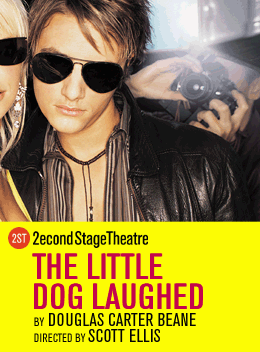
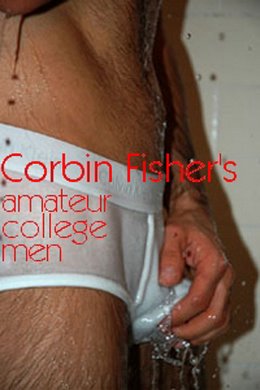

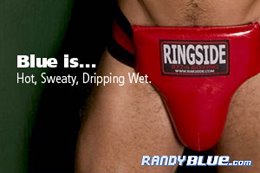

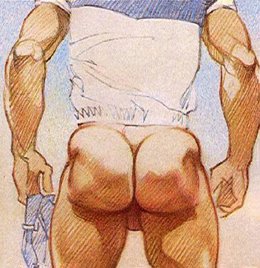
0 Comments:
Post a Comment
<< Home